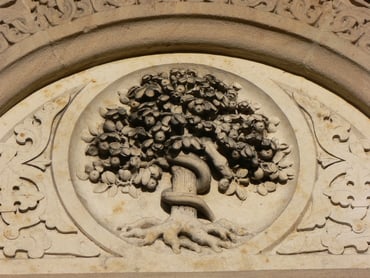Erläuterung zu Genesis 3:3
原作者: Brian David (机器翻译成: Deutsch)

Das Essen vom Baum der Erkenntnis bedeutet, dass wir mit unserer eigenen Logik und Vernunft versuchen, den Herrn zu verstehen und zu begreifen - etwas, das über uns hinausgeht und das wir letztlich einfach akzeptieren müssen. Dies wurde den Menschen in dieser Phase der Urkirche verboten, weil der Herr wusste, dass sie sonst ihre unschuldige Akzeptanz der Liebe und Führung des Herrn verlieren und sie stattdessen in Frage stellen würden. Dies wird durch die Vorstellung dargestellt, dass sie "sterben" würden.
(参考: Himmlischen Geheimnissen 198, 200, 201, 202, 203)
Arcana Coelestia#7780
7780. 'Even to the firstborn of the servant-girl who is behind the mill' means falsified truths of faith that occupy the very last place. This is clear from the meaning of 'the firstborn' as faith, dealt with immediately above in 7779, and since faith is meant, so is truth in its entirety because truth, being that which one ought to believe, is the component of faith; and from the meaning of 'a servant-girl' as a rather external affection for truth, or an affection for knowledge, dealt with in 1895, 2567, 3835, 3849, and 'the servant-girl behind the mill' as the most external affection for knowledge since 'behind the mill' means that which occupies the very last place. The expression 'behind the mill' is used because 'the mill' has reference to matters of faith. For by means of a mill grain is ground into flour and so prepared for making bread, and 'flour' means truth which results in good, 'bread' the actual good that results from it. Thus 'sitting at the mill' is acquiring and learning the kinds of things that will be of service to faith, and through faith of service to charity. This is why when the ancients described learning the basic elements of faith they described it as 'sitting at the mill', or learning elements even more basic as 'sitting behind the mill'. It is because such things were meant that in His teachings about the final period of the Church the Lord says,
Two women grinding at the mill; one will be taken and the other will be left behind. Matthew 24:41.
These words would never have been used if 'the mill' had not meant matters of faith. For what 'the mill' and 'grinding' mean in the internal sense, see 4335. With regard to the truths of faith that occupy the first place and those that occupy the very last, it should be recognized that the truths of faith which emanate directly from the good of charity occupy the first place, for they are the outward form taken by good, whereas the truths which occupy the last place are bare truths. For when truths derive in succession from good, each degree of them departs further away from it, till at length they become bare truths. This is the kind of truths meant by 'servant-girls behind mills'.






